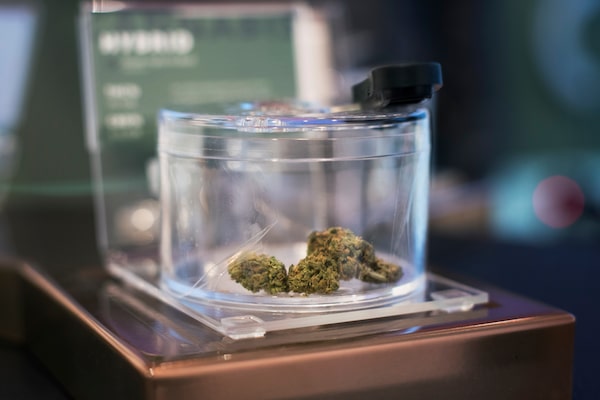
A container of cannabis is seen on display at the Hunny Pot, a cannabis store in downtown Toronto.Fred Lum/The Globe and Mail
Part of cannabis and small business and retail
Legalization has empowered authorities across the country to shutter all but several dozen of the illegal cannabis storefronts that once numbered in the hundreds in the months preceding Canada’s historic end to prohibition last fall.
And yet, despite more than 200 illicit shops in Toronto and Vancouver either closing over the past year or transitioning to pursue licences from the provinces, online sales from illegal cannabis retailers are proving much more difficult to stamp out.
Abbotsford police Chief Mike Serr, a former Vancouver gang officer who chairs the drug advisory committee of the Canadian Association of Chiefs of Police, said municipalities and police agencies have been successful working together to shut down unlicensed marijuana shops since the drug was legalized Oct. 17, but there has been “a real boom” in the number of online portals delivering illegal cannabis right to people’s doorsteps.
“Unfortunately it’s been described as a whack-a-mole: We take down one site and two more open up,” Chief Serr said.
“If you were to do a simple Google search, you would see numerous sites coming up and one of the issues for consumers is it’s really difficult to tell online who is a legal seller and who is an illegal seller.”
There are no data on how many online retailers are selling illicit cannabis across the country, with many offering free shipping on a wide variety of edibles and concentrates not for sale on government-run web portals. And it is also unclear which agency is spearheading the fight to clamp down on this illegal competition. Crushing the sizable underground trade in cannabis was a core priority for the Liberal government when it legalized the drug last fall.
Chief Serr said police have been able to stop at least two online dispensaries after targeting the owners of the internet servers housing these illegal websites, their virtual landlords.
“As far as shutting down the domains, most servers have a contract in place where you’re not to be selling illicit substances, so there have been some success stories throughout the country,” Mr. Serr said.
It takes resources for police departments to start criminal investigations into these online operations and these cases are complicated by the sites often having sophisticated structures with shadowy footprints, he said. Meanwhile, he said, police across the country are also trying to stamp out the illicit trade in deadly opioids.
A spokesperson for Bill Blair, federal Border Security and Organized Crime Reduction Minister, did not respond to a request for comment Tuesday afternoon. When asked about the issue of illegal online cannabis sales earlier this summer, his office said Ottawa has taken steps to crack down on these private online retailers, including providing $113.5-million over the next five years to Public Safety Canada, the RCMP and the Canada Border Services Agency to “deal with illegal production and distribution.”
Mark Sraga, the City of Toronto’s director of investigation services, said these illicit online businesses are only filling a vacuum in supply for a consumer base that isn’t able to access enough legal cannabis in Ontario.
Still, he said the shift away from criminal charges under new provincial and federal cannabis laws has enabled his city to reduce the illicit storefronts to less than 10 from more than 90 right before legalization.
“Police are there with us with a much smaller footprint – they’re there to keep the peace as we carry out our enforcement duties,” Mr. Sraga said. “But instead of tying up eight police officers, only two officers are needed, so it’s a much more effective utilization of all our resources.”
Kathryn Holm, Vancouver’s chief licence inspector, said Tuesday that only six illegal shops are now operating in her city, which is down from a peak of more than 100 before legalization.
B.C.'s Community Safety Unit has conducted several dispensary raids at locations across the province, but would not provide any statistics on their enforcement to date.
 Mike Hager
Mike Hager